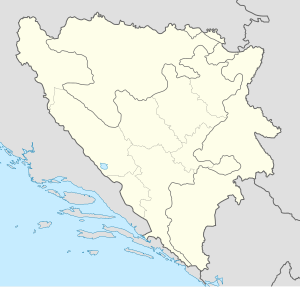| Operation Southern Move | |||||||
|---|---|---|---|---|---|---|---|
| Part of the Bosnian War | |||||||
Objectives of Operation Southern Move ( | |||||||
| |||||||
| Belligerents | |||||||
|
|
| ||||||
| Commanders and leaders | |||||||
|
|
| ||||||
| Units involved | |||||||
|
|
| ||||||
| Strength | |||||||
| 11,000–12,000 troops | 5,500 troops | ||||||
| Casualties and losses | |||||||
| See Aftermath section | |||||||
Operation Southern Move (Croatian: Operacija Južni potez) was the final Croatian Army (HV) and Croatian Defence Council (HVO) offensive of the Bosnian War. It took place in western Bosnia and Herzegovina on 8–11 October 1995. Its goal was to help the Army of the Republic of Bosnia and Herzegovina (ARBiH) whose positions around the town of Ključ, captured by them during Operation Sana, were endangered by a counteroffensive by the Army of Republika Srpska (VRS). The objectives of Operation Southern Move included the capture of the town of Mrkonjić Grad and positions on the Manjača Mountain which would allow the HV and the HVO to directly threaten Banja Luka, the largest city controlled by Bosnian Serbs. Finally, the offensive was also aimed at capturing the Bočac Hydroelectric Power Station, the last significant source of electricity under VRS control in western Bosnia and Herzegovina. The combined HV and HVO forces were under the overall command of HV Major General Ante Gotovina.
The offensive achieved its objectives, and significantly contributed, along with Operations Sana and Maestral 2, to forcing the Bosnian Serb leadership to serious peace negotiations. The offensive also contributed to the displacement of 10,000 Bosnian Serb refugees and resulted in the deaths of at least 181 Serbs while hundreds more went missing following the operation. A country-wide ceasefire came into effect on 12 October, one day after the offensive ended, and was soon followed by negotiations which produced the Dayton Agreement, ending the Bosnian War.
